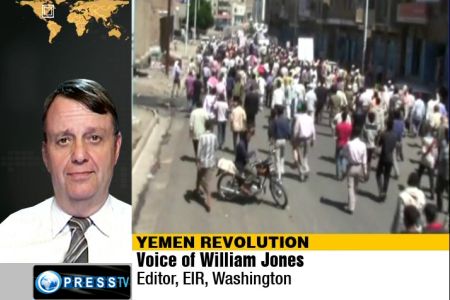Video- ‘US silence on Yemen favors Riyadh’

Nationwide protests in Yemen against the US-backed regime of Ali Abdullah Saleh continue despite the harsh crackdown by the security forces.
Meanwhile, Saleh has once again promised to step down, but the anti-regime protesters say they will continue holding demonstrations until they see it with their eyes.
The embattled Yemeni ruler has repeatedly vowed to resign but has backed out at the last minute.
Press TV has interviewed William Jones from the Executive Intelligence Review in Washington, about why Saleh refuses to step down despite the growing national and international calls for him to do so.
Press TV: Every time Saleh says he is stepping down he ups the violence. Why can he not just admit he is not willing to go -willingly at least?
Jones: That is a good question. People here are very cautious in these latest moves by Saleh. They are happy with the fact that he called for a ceasefire, although they want to see action on the ground, and he also indicated that he would be willing to sign the (Persian) Gulf Cooperation Council ([P]GCC) agreement. All of this has got to be accomplished in fact before anybody is happy but I would say there is really a mood of caution here because he really hasn’t been willing to step up to the plate at this point and so people are in kind of wait and see attitude as this thing progresses.
Press TV: Much can be said about Saudi and US involvement in Yemen. Is there a feeling in the US that the administration doesn’t want to anger the Saudis by siding with the protesters?
Jones: In one sense there is probably some … there, with a Saudi factor it is a bit more sensitive than any of the other previous Arab Spring developments but I think there is also a certain amount of caution because they don’t exactly know what the nature of the opposition is, as far as I know they have not had direct contact with them, but they don’t want to get out in front on this one -probably because the Saudi interest in this is much greater than in any previous developments in Northern Africa.
Press TV: Tribal loyalties, as we’ve been told, are vital to Yemenis. Considering tribes keep deflecting from Saleh’s side, how can the likes of the US/UN/even Saudi Arabia, not see how this will not end well for regional stability?
Jones: It is essentially forces within the country which are going to be the determining factor but like in the situation, let’s take a comparison, in Libya the US was also not going to get in front of that but the French and British pushed the situation so that NATO got involved in that; there wasn’t also a lot of enthusiasm in the beginning on the US side for getting directly involved in that, less so in the case of Yemen where the Saudis are playing a much direct and active role in this situation than anywhere else. So you have got a further complicating factor for the US because nobody wants to start a fight with the Saudis on the issue but at the same they would like to see some kind of stability come to Yemen.








